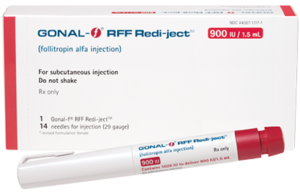Using Gonal-f® in Fertility Treatment: IUI and IVF
There are many reasons why a woman might have difficulty getting pregnant, but one of the most common has to do with problems that may occur with ovulation. In such cases, the underlying cause is often a lack of follicle-stimulating hormone (FSH) being produced by the pituitary gland.

When the pituitary gland does not produce enough FSH, the follicles in the ovaries do not “wake up” and grow. In turn, this can make it exceedingly difficult for pregnancy to occur. To help increase the potential for a successful pregnancy, it is not uncommon for a doctor to prescribe a gonadotropin, like Gonal-f®.
What Is Gonal-f®?
Gonal-f® is the brand name for an injectable human follicle stimulating hormone (FSH) called follitropin alfa. The medication works by stimulating the follicles (eggs) in the ovaries, so they can develop, grow, and activate ovulation.
Gonal-f® is available in three different formulations:
• Gonal-f® RFF Redi-ject®
• Gonal-f® RFF 75 IU vial
• Gonal-f® Multidose
When Is Gonal-f® Used?
Gonal-f® is prescribed when a woman who wants to become pregnant has ovaries capable of producing follicles, but her pituitary gland is unable to produce enough hormones to stimulate the follicles to maturity.
When taking Gonal-f®, it is important to schedule and keep regular visits with your doctor. This way, your progress can be monitored and any unwanted side effects can be treated. Your doctor will also likely perform routine ultrasound examinations and blood tests to measure the level of hormones in the blood. Your doctor will then continue to follow your progress for at least two weeks after the Gonal-f® treatment program has been completed.
Dosage and Administration of Gonal-f®
Dosage of Gonal-f® may differ for each patient. This medication can be taken at varying strengths. Further, the number of doses per day and the time allowed between doses is tailored to each individual patient, so always follow your doctor’s orders or the directions that are printed on the label.
On average, however, when used for the treatment of female infertility, the usual dose is “75 international units (IU) injected under the skin once a day for approximately fourteen days. The dose may be increased at weekly intervals by 37.5 IU, up to a total dose of 300 IU once a day.”
In some cases, a patient may need to take Gonal-f® for longer than fourteen days but should only do so if directed by their doctor. After the last dose of Gonal-f® has been administered, an injection of hCG may be administered twenty-four hours later.

If abdominal pain occurs with the use of follitropin alfa, report it to your doctor immediately, discontinue treatment, do not receive the dose of human chorionic gonadotropin (hCG), and avoid sexual intercourse.
In cases where the patient is being treated with assisted reproductive technology (ART) procedures, the dosage will be different. On average, the dose will be “150 international units (IU) injected under the skin once a day for five days beginning on Day 2 or Day 3 of your menstrual cycle. After five days, your dose may be increased by 75 to 150 IU every three to five days, up to a total dose of 450 IU once a day, for up to five more days. Some patients may start treatment at a dose of 225 IU once a day.”
Occasionally, a patient following ART procedures may need to take Gonal-f® for longer than ten days but should only do so if directed by their doctor. After the last dose of Gonal-f® has been administered, an injection of hCG is usually given twenty-four hours later.
Unlike other brands of human follicle stimulating hormone, Gonal-f® RFF Redi-ject® pens feature more overfill to ensure patients always get the appropriate amount of the medication with the least amount of waste.
Special Precautions for Using Gonal-f®
When being treated with Gonal-f®, you should be recording your basal body temperature (BBTs) daily because this will help you determine when ovulation is occurring, and when you are most fertile. It is during this time that sexual intercourse should take place to give you the best chance of becoming pregnant.
Gonal-f® should also be used with caution or avoided completely in patients with certain pre-existing conditions, including:
• Asthma
• Adrenal gland disease
• Thyroid disease
• Abnormal bleeding of the genitals
• Ovarian cysts
• Ovarian torsion
• Pulmonary and vascular complications
• Enlarged ovaries
• Sex hormone-dependent tumor
• Primary ovarian failure
Possible Side Effects of Gonal-f®
In some patients, Gonal-f® injections can cause side effects, the most common of which include headache, pain in the abdomen, and ovarian hyperstimulation. Some patients may experience injection site reactions, such as pain, swelling, inflammation, or bruising. If you develop pain in your abdomen after taking this medication, discontinue use and notify your doctor immediately. Avoid sexual intercourse and do not administer the injection of hCG prior to seeing your doctor.
Another potential side effect of using Gonal-f® is dizziness. If you feel lightheaded after taking this medication, do not drive or use machinery. Avoid doing anything that requires alertness or that could be dangerous if you are not alert, for at least 24 hours after you stop using it.
Sources:
https://www.emdseronofertility.com/en_US/patient/fertilitytreatments/Gonal-f® .html
https://www.verywellfamily.com/what-are-gonadotropins-1960179
https://us.fertility.com/fertility-facts/infertility-treatment-cycles
https://www.fertilitysavings.com/resources/pdfs
https://www.emdseronofertility.com/en_US/patient/fertilitytreatments/Gonal-f® .html
https://resolve.org/what-are-my-options/medications/types-medications/

